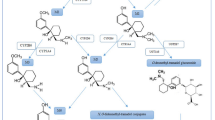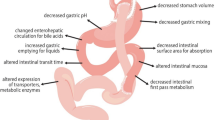Abstract
Tachykinin NK2 receptor (NK2R) agonists have potential to alleviate clinical conditions associated with bladder and gastrointestinal under activity. The effects of agonists with differing selectivity for NK2R over NK1Rs on colorectal, bladder, and cardiovascular function were examined in anesthetized dogs. Intravenous (IV) administration of NKA, LMN-NKA ([Lys5,MeLeu9,Nle10]-NKA(4–10)), and [β-Ala8]-NKA(4–10) caused a dose-related increase in colorectal pressure (up to 98 mmHg) that was blocked by pretreatment with the NK2R antagonist GR 159897 (1 mg/kg), and hypotension (decrease in mean arterial pressure of ~40 mmHg) that was blocked by the NK1R antagonist CP-99,994 (1 mg/kg). Despite the greater in vitro selectivity of LMN-NKA and [β-Ala8]-NKA(4–10) for NK2R over NK1Rs compared with NKA, all 3 agonists increased colorectal pressure and caused hypotension within a similar dose range when administered as a bolus (0.1–300 μg/kg IV), or even as a slow IV infusion over 5 min (NKA; 0.02–0.6 μg/kg/min). In contrast, subcutaneous (SC) administration of LMN-NKA (3–10 μg/kg) increased colorectal pressure (up to 50 mmHg) and elicited micturition (≧ 85% voiding efficiency) without causing hypotension. NK2R agonists can produce rapid-onset, short-duration, colorectal contractions, and efficient voiding of urine without hypotension after SC administration, indicating that routes of administration that avoid the high plasma concentrations associated with IV dosing improve the separation between desired and unwanted pharmacodynamic effects. The potent hypotensive effect of NKA in dogs was unexpected based on published studies in humans in which IV infusion of NKA did not affect blood pressure at doses that increased gastrointestinal motility.







Similar content being viewed by others
References
Bae J, Johnston TA, Chaiittianan R, Sutthanut K, Jay M, Marson L (2017) Characterization and in vivo efficacy of a heptapeptide ODT formulation for the treatment of neurogenic bladder dysfunction. Int J Pharm 536(1):397–404. https://doi.org/10.1016/j.ijpharm.2017.11.036
Brahim JS, Thut PD (1984) Hemodynamic changes in dogs during isoflurane anesthesia. Anesth Prog 31(5):207–212
Burcher E, Atterhög JH, Pernow B, Rosell S (1977) Cardiovascular effects of substance P: effects on the heart and regional blood flow in the dog. In: von Euler US, Pernow B (eds) Substance P. Raven Press, New York, pp 261–268
Burcher E, Shang F, Warner FJ, Du Q, Lubowski DZ, King DW, Liu L (2008) Tachykinin NK2 receptor and functional mechanisms in human colon: changes with indomethacin and in diverticular disease and ulcerative colitis. J Pharmacol Exp Ther 324(1):170–178. https://doi.org/10.1124/jpet.107.130385
Bushfield M, Metcalfe M, Naylor AM (1995) Activation of the micturition reflex by NK2 receptor stimulation in the anaesthetized guinea-pig. Br J Pharmacol 115:875–882
Cevese A, Poltronieri R, Schena F, Vacca G, Mary DA (1990) The effect of distension of the urinary bladder on left ventricular inotropic state in anesthetized dogs. Cardioscience 1(4):247–253
Cevese A, Mary DA, Poltronieri R, Schena F, Vacca G (1992) Haemodynamic effects of distension of the descending colon in anaesthetized dogs. J Physiol 447(1):409–423. https://doi.org/10.1113/jphysiol.1992.sp019009
Constantine JW, Lebel WS, Woody HA (1991) Inhibition of tachykinin induced hypotension in dogs by CP-96,345, a selective blocker of NK-1 receptors. Naunyn Schmiedebergs Arch Pharmacol 344:471–417
Darmani NA, Wang Y, Abad J, Ray AP, Thrush GR, Ramirez J (2008) Utilization of the least shrew as a rapid and selective screening model for the antiemetic potential and brain penetration of substance P and NK1 receptor antagonists. Brain Res 1214:58–72. https://doi.org/10.1016/j.brainres.2008.03.077
Evans TW, Dixon CM, Clarke B, Conradson TB, Barnes PJ (1988) Comparison of neurokinin A and substance P on cardiovascular and airway function in man. Br J Clin Pharmacol 25(2):273–275. https://doi.org/10.1111/j.1365-2125.1988.tb03302.x
Hastrup H, Schwartz TW (1996) Septide and neurokinin A are high-affinity ligands on the NK-1 receptor: evidence from homologous versus heterologous binding analysis. FEBS Lett 399(3):264–266. https://doi.org/10.1016/S0014-5793(96)01337-3
Kullmann FA, Katofiasc M, Thor KB, Marson L (2017) Pharmacodynamic evaluation of Lys5,MeLeu9, Nle10-NKA(4-10) prokinetic effects on bladder and colon activity in acute spinal cord transected and spinally intact rats. Naunyn Schmiedebergs Arch Pharmacol 390(2):163–173. https://doi.org/10.1007/s00210-016-1317-4
Lordal M, Theodorsson E, Hellstrom PM (1997) Tachykinins influence interdigestive rhythm and contractile strength of human small intestine. Dig Dis Sci 42(9):1940–1949. https://doi.org/10.1023/A:1018875529739
Lordal M, Navalesi G, Theodorsson E, Maggi CA, Hellstrom PM (2001) A novel tachykinin NK2 receptor antagonist prevents motility-stimulating effects of neurokinin A in small intestine. Br J Pharmacol 134(1):215–223. https://doi.org/10.1038/sj.bjp.0704217
Maggi CA, Giuliani S, Santicioli P, Abelli L, Regoli D, Meli A (1987) Further studies on the mechanism responsible for the tachykinin-induced activation of reflex micturition: evidence for the involvement of the capsaicin-sensitive bladder mechanoreceptors. Eur J Pharmacol 136(2):189–205. https://doi.org/10.1016/0014-2999(87)90711-4
Maggi CA, Giuliani S, Santicioli P, Abelli L, Giachetti A (1991) Facilitation of reflex micturition by intravesical administration of [β-Ala8]NKA(4-10), a selective NK2 tachykinin receptor agonist. J Urol 145(1):184–187. https://doi.org/10.1016/S0022-5347(17)38287-3
Marson L, Thor KB, Katofiasc M, Rupniak NMJ (2017) Prokinetic effects of NK2 receptor agonists on the bladder and rectum of rats with acute spinal cord transection. Eur J Pharmacol 819:261–269. https://doi.org/10.1016/j.ejphar.2017.12.017
Mussap CJ, Stamatakos C, Burcher E (1996) Radioligand binding, autoradiographic and functional studies demonstrate tachykinin NK-2 receptors in dog urinary bladder. J Pharmacol Exp Ther 279:423–434
Newby DE, Sciberras DG, Mendel CM, Gertz BJ, Boon NA, Webb DJ (1997) Intra-arterial substance P mediated vasodilatation in the human forearm: pharmacology, reproducibility and tolerability. Br J Clin Pharmacol 43(5):493–499
Palea S, Corsi M, Artibani W, Ostardo E, Pietra C (1996) Pharmacological characterization of tachykinin NK2 receptors on isolated human urinary bladder, prostatic urethra and prostate. J Pharmacol Exp Ther 277(2):700–705
Parlani M, Conte B, Cirillo R, Manzini S (1996) Characterization of tachykinin NK2 receptor on dog proximal colon. Antagonism by MEN 10,627 and SR 48,968. Eur J Pharmacol 318(2-3):419–424. https://doi.org/10.1016/S0014-2999(96)00799-6
Perretti F, Ballati L, Manzini S, Maggi CA, Evangelista S (1995) Antibronchospastic activity of MEN10,627, a novel tachykinin NK2 receptor antagonist, in guinea-pig airways. Eur J Pharmacol 273(1-2):129–135. https://doi.org/10.1016/0014-2999(94)00667-V
Rupniak NM, Tattersall FD, Williams AR, Rycroft W, Carlson EJ, Cascieri MA, Sadowski S, Ber E, Hale JJ, Mills SG, MacCoss M, Seward E, Huscroft I, Owen S, Swain CJ, Hill RG, Hargreaves RJ (1997) In vitro and in vivo predictors of the anti-emetic activity of tachykinin NK1 receptor antagonists. Eur J Pharmacol 326(2-3):201–209. https://doi.org/10.1016/S0014-2999(97)85415-5
Sagan S, Chassaing G, Pradier L, Lavielle S (1996) Tachykinin peptides affect differently the second messenger pathways after binding to CHO-expressed human NK-1 receptors. J Pharmacol Exp Ther 276:1039–1048
Schmidt PT, Lordal M, Gazelius B, Hellstrom PM (2003) Tachykinins potently stimulate human small bowel blood flow: a laser Doppler flowmetry study in humans. Gut 52(1):53–56. https://doi.org/10.1136/gut.52.1.53
Sherwood JE, Young S, Selig W, Schilling A, Kreutner W, Egan RW, Chapman RW (1998) A method to measure dual NK1/NK2-antagonist activity in dogs. J Pharmacol Toxicol Methods 39(2):97–101. https://doi.org/10.1016/S1056-8719(98)00003-3
Strigas J, Burcher E (1996) Autoradiographic localization of tachykinin NK2 and NK1 receptors in the guinea-pig lung, using selective radioligands. Eur J Pharmacol 311(2-3):177–186. https://doi.org/10.1016/0014-2999(96)00412-8
Torrens Y, Beaujouan JC, Saffroy M, Glowinski J (2000) Further evidence for the presence of “septide-sensitive” tachykinin binding sites in tissues possessing solely NK(1) tachykinin receptors. Biochem Biophys Res Commun 270(2):668–772. https://doi.org/10.1006/bbrc.2000.2477
van Koeveringe GA, Vahabi B, Andersson KE, Kirschner-Herrmans R, Oelke M (2011) Detrusor underactivity: a plea for new approaches to a common bladder dysfunction. Neurourol Urodyn 30(5):723–728. https://doi.org/10.1002/nau.21097
Warner FJ, Miller RC, Burcher E (2003) Human tachykinin NK2 receptor: a comparative study of the colon and urinary bladder. Clin Exp Pharmacol Physiol 30(9):632–639. https://doi.org/10.1046/j.1440-1681.2003.03887.x
Zinner MJ, Yeo CJ, Jaffe BM (1984) The effect of carcinoid levels of serotonin and substance P on hemodynamics. Ann Surg 199(2):197–204. https://doi.org/10.1097/00000658-198402000-00012
Acknowledgements
We thank Ed Burgard for the administrative work and helpful discussion of the data. We gratefully acknowledge Synchrony Labs for their collaboration.
Author information
Authors and Affiliations
Corresponding author
Ethics declarations
Conflict of interest
Authors NMJR, MK, LM, and KBT are employed by Dignify Therapeutics. Authors NMJR, MK, LM, and KBT have equity ownership in Dignify Therapeutics.
Ethical approval
All applicable international, national, and institutional guidelines for the care and use of laboratory animals were followed. All procedures performed on animals were in accordance with the ethical standards of the Synchrony Labs animal care and use committees and followed the NIH guidelines for the Care and Use of Laboratory Animals. This article does not contain any studies with human participants.
Rights and permissions
About this article
Cite this article
Rupniak, N.M.J., Katofiasc, M., Marson, L. et al. NK2 and NK1 receptor-mediated effects of NKA and analogs on colon, bladder, and arterial pressure in anesthetized dogs. Naunyn-Schmiedeberg's Arch Pharmacol 391, 299–308 (2018). https://doi.org/10.1007/s00210-017-1458-0
Received:
Accepted:
Published:
Issue Date:
DOI: https://doi.org/10.1007/s00210-017-1458-0




